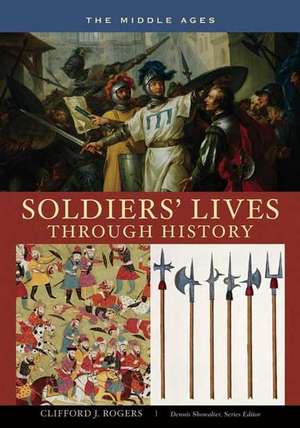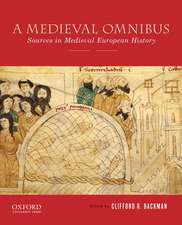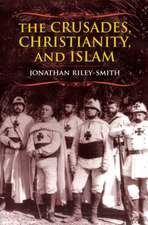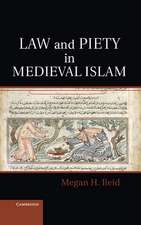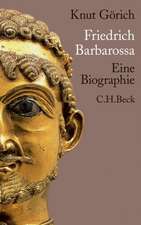Soldiers' Lives through History - The Middle Ages: Soldiers' Lives through History
Autor Clifford J. Rogersen Limba Engleză Hardback – 29 apr 2007 – vârsta până la 17 ani
Preț: 310.13 lei
Preț vechi: 531.41 lei
-42% Nou
Puncte Express: 465
Preț estimativ în valută:
59.34€ • 62.13$ • 49.10£
59.34€ • 62.13$ • 49.10£
Carte tipărită la comandă
Livrare economică 05-19 aprilie
Preluare comenzi: 021 569.72.76
Specificații
ISBN-13: 9780313333507
ISBN-10: 0313333505
Pagini: 336
Dimensiuni: 178 x 254 x 27 mm
Greutate: 0.85 kg
Editura: Bloomsbury Publishing
Colecția Greenwood
Seria Soldiers' Lives through History
Locul publicării:New York, United States
ISBN-10: 0313333505
Pagini: 336
Dimensiuni: 178 x 254 x 27 mm
Greutate: 0.85 kg
Editura: Bloomsbury Publishing
Colecția Greenwood
Seria Soldiers' Lives through History
Locul publicării:New York, United States
Notă biografică
Clifford J. Rogers is Professor of History at the United States Military Academy. He is the author of many publications, including The Wars of Edward III: Sources and Interpretations (1999) and The Military Revolution Debate (1995).
Recenzii
. . .this work provides a valuable survey of many of the central questions in the investigation of the life of the soldier during the Middle Ages. It will be a useful and highly readable textbook for undergraduate courses in military history and a companion volume for medieval and Western civilization courses.
Rogers does not flinch as he describes the lives of soldiers serving from Scotland to Portugal and from the Frankish Levant to the Baltics from the fall of the Roman Empire to the end of the fifteenth century. Wisely taking an impressionistic rather than analytical approach to this enormous subject, he strives for a balanced portrait of what soldiers did to kill each other and protect themselves, how they were organized and led, how the warfare in which they were engaged was conducted, and how they were supported and supplied. He covers soldiering in peacetime, the business of recruitment, life in camp and on the march, sieges, battle strategies and consequences (including the truly horrific medical care) and the art of the little war, in which participants provided escorts, committed extortion or ambushed each other.
Scholars will appreciate the synthesis of medieval soldiering on a grand scale, and will come away with a renewed respect, both for the ingenuity of the medieval soldier as well as the meticulous scholarship of the author. Soldiers' Lives Through History: The Middle Ages should be on the shelf of every serious student of medieval warfare.
For both military and social historians, Rogers's work is a very valuable contribution that stands as a worthy companion to the studies of Philippe Contamine, Helen Nicholson, and Michael Prestwich. His range of scholarly vision beyond the medieval heartlands of England and France will make this work doubly valuable to historians of southern and eastern Europe. From its fine organization, content, and style, Rogers's book will continue military history's contemporary trend of pushing its way from the fringes to the very forefront of Clio's realm.
The diversity of the experiences of European soldiers in the period from the end of the Roman empire in the west to the late fi fteenth century makes any attempt to provide an overall picture extremely diffi cult. This is, however, a challenge that Clifford Rogers relishes, and which he meets with great success. . . . The book is solidly based on wide reading of an extensive range of sources, as the use of frequent and well-chosen quotations makes clear. . . . This is a fine book, solidly rooted in the sources, which displays an impressively wide range of learning.
. . . Rogers should be complimented for the depth and concision with which he has explored this subject. This book is an excellent complement to major general works on medieval military history, such as those by Philippe Contamine or Michael Prestwich, and should be a required addition to any collection of texts on medieval military history.
Rogers does not flinch as he describes the lives of soldiers serving from Scotland to Portugal and from the Frankish Levant to the Baltics from the fall of the Roman Empire to the end of the fifteenth century. Wisely taking an impressionistic rather than analytical approach to this enormous subject, he strives for a balanced portrait of what soldiers did to kill each other and protect themselves, how they were organized and led, how the warfare in which they were engaged was conducted, and how they were supported and supplied. He covers soldiering in peacetime, the business of recruitment, life in camp and on the march, sieges, battle strategies and consequences (including the truly horrific medical care) and the art of the little war, in which participants provided escorts, committed extortion or ambushed each other.
Scholars will appreciate the synthesis of medieval soldiering on a grand scale, and will come away with a renewed respect, both for the ingenuity of the medieval soldier as well as the meticulous scholarship of the author. Soldiers' Lives Through History: The Middle Ages should be on the shelf of every serious student of medieval warfare.
For both military and social historians, Rogers's work is a very valuable contribution that stands as a worthy companion to the studies of Philippe Contamine, Helen Nicholson, and Michael Prestwich. His range of scholarly vision beyond the medieval heartlands of England and France will make this work doubly valuable to historians of southern and eastern Europe. From its fine organization, content, and style, Rogers's book will continue military history's contemporary trend of pushing its way from the fringes to the very forefront of Clio's realm.
The diversity of the experiences of European soldiers in the period from the end of the Roman empire in the west to the late fi fteenth century makes any attempt to provide an overall picture extremely diffi cult. This is, however, a challenge that Clifford Rogers relishes, and which he meets with great success. . . . The book is solidly based on wide reading of an extensive range of sources, as the use of frequent and well-chosen quotations makes clear. . . . This is a fine book, solidly rooted in the sources, which displays an impressively wide range of learning.
. . . Rogers should be complimented for the depth and concision with which he has explored this subject. This book is an excellent complement to major general works on medieval military history, such as those by Philippe Contamine or Michael Prestwich, and should be a required addition to any collection of texts on medieval military history.
